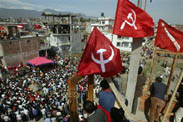Nepal's communist insurgents vow to press their fight for republic
For Nepal's communist insurgents, the protests against King Gyanendra are over, but the war is not.

Nearly three weeks of bloody unrest may have brought the rebels within days, if not hours, of seeing the king forced from power a goal perhaps now delayed, but one the insurgents insist will be accomplished, if not peacefully, then through violence.
"Our fight will continue," said Matrika Yadav, the highest-ranking Maoist leader imprisoned by the government.
Burning barricades have given way to cars, people and pushcarts on the streets of Nepal, but peace remains elusive in this Himalayan kingdom where the Maoists appear intent on fighting on with or against what increasingly appear to be their former allies in the country's seven-party opposition alliance.
The rebels are for now "being flexible in order to trust the parties" to help overthrow the king, Yadav said, striking a rare conciliatory note in a more than hour-long jailhouse interview Wednesday.
But he warned: "If anyone goes against the people, their downfall is inevitable, whether it is the political parties or the monarchy or any force."
The Maoists, of course, are the voice of the people, he said. And the people's will? Nothing short of a communist state, he insisted.
As incongruous as a communist revolution seems in the 21st century, Yadav insisted that wherever there was inequality, communism will eventually triumph "even in the U.S.A."
The rebel's actual support is hard to gauge. Their decade-long fight has won them control of much of the countryside, but they often govern through fear killing those who oppose them and demanding food, equipment and even child volunteers from peasant families.
Still, their communist vision such as abolishing private property resonates deeply in Nepal, where per capita income is US$25 a month and many toil as farmers for feudal landlords, reports AP.
O.Ch.
Subscribe to Pravda.Ru Telegram channel, Facebook, RSS!




